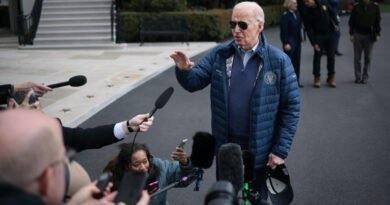IFS: Parties Dodging Tough Decisions on Taxes, Spending, and Debt
The fiscal think tank stated that unless the next government gets lucky, they will soon be faced with a ‘stark choice’ among the trilemma.
According to the Institute for Fiscal Studies (IFS), both Labour and the Conservatives have been evading the challenging fiscal decisions confronting the country.
When presenting the think tank’s evaluation of election manifestos, IFS Director Paul Johnson reiterated the organization’s previous observation that there has been a “conspiracy of silence” regarding the parties’ spending plans.
Mr. Johnson emphasized that without good fortune, the upcoming government will confront a tough decision among raising taxes, implementing spending cuts, or breaking fiscal rules by accumulating more debt.
Regardless of which party emerges victorious on July 4, the next UK government will inherit the highest debt level in over 60 years and the heaviest tax burden in over 70 years.
While both the Conservative Party and Labour have committed to reducing debt as a percentage of GDP within five years, Mr. Johnson mentioned that the escalating costs of debt interest, sluggish growth, energy prices, and surging demands for welfare, health, defense, and green investments will force the next government to address the trilemma.
“These essential facts are largely overlooked by the two main parties in their manifestos. The significant decisions regarding the size and structure of the state that will need to be made, and the likelihood that these decisions will necessitate either increased taxes or reduced public services, are not adequately addressed in their pledges or assurances,” he stated.
“They have notably failed to even acknowledge some of the most critical issues and choices that have confronted us for a considerable time. As the population ages, these choices will become more challenging, not easier. We cannot simply wish them away.”
In a statement on Sunday, IFS research economist Bee Boileau remarked that neither manifesto outlines plans to increase public spending adequately to avoid budget cuts, nor do they specify where these cuts may occur.
Reeves: ‘Challenging Decisions’ on the Horizon
During a speech in Scotland on Monday, Labour shadow chancellor Rachel Reeves emphasized the necessity of making “challenging decisions” if her party takes power.
She assigned the blame to the Tories, accusing them of leaving the UK’s finances in disarray, and noted that it will be a process to rectify their damage after 14 years of Conservative governance.

Reeves expressed her commitment to not disappoint the public or make unattainable promises, while also stressing the imperative of expanding the UK economy to generate additional funds needed for public services.
She reiterated that “there will be no return to austerity under a Labour government,” emphasizing the importance of economic growth, which she believes has been lacking over the last 14 years.
“Had our economy grown at the average rate of similar OECD economies in the past 14 years, our economy would have been £150 billion larger,” she stated.
She highlighted that sustained growth at this pace could supply £55 billion annually for public services, affirming, “That is the significance of economic growth.”
In its manifesto, Labour positioned itself as “the party of wealth creation.”
Ms. Reeves, during a visit to the Whitelee wind farm in Glasgow, the UK’s largest onshore wind farm, emphasized that Labour’s proposals revolve around economic growth, with plans to overhaul planning and skills formation outlined in their election manifesto.
Asked about Sir Keir Starmer’s opinion that assuming the UK economy won’t swiftly regenerate is “defeatist,” Mr. Johnson stated during the IFS event that it is “wise” to prepare for a worst-case scenario when forecasts are pessimistic and “inappropriate” not to do so.
Mr. Johnson criticized the manifestos of Reform UK and Green Party for offering unrealistic promises, with Reform advocating for a smaller state and Green promising a larger one, stating that their proposals are “wholly unattainable and detrimental to the entire political discourse.”
PA Media contributed to this report.





